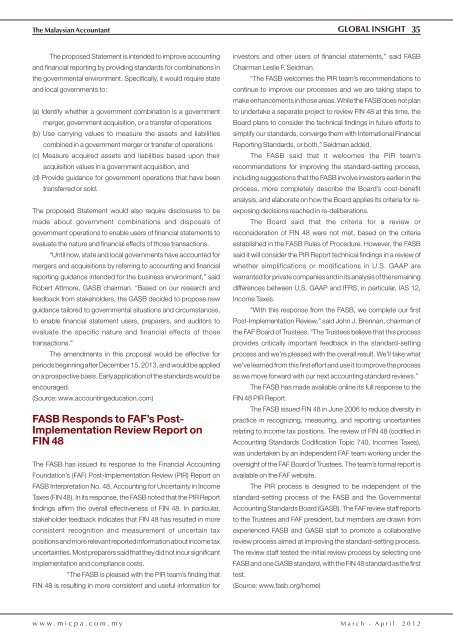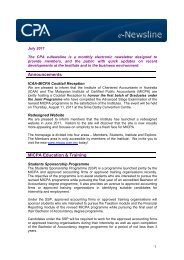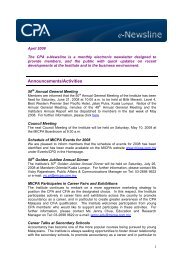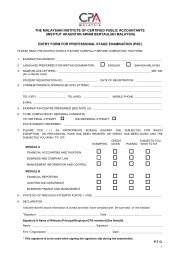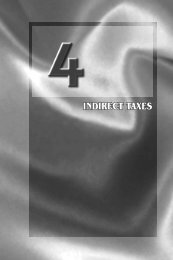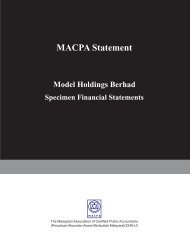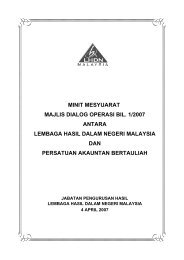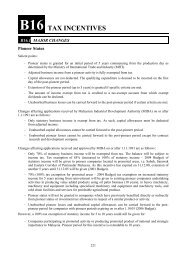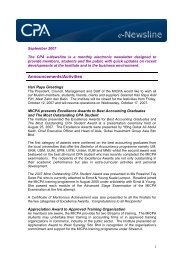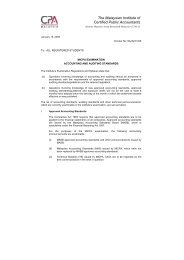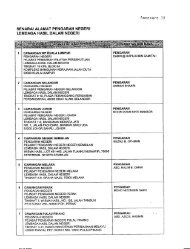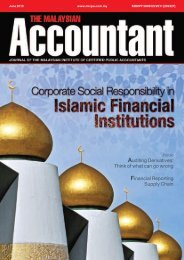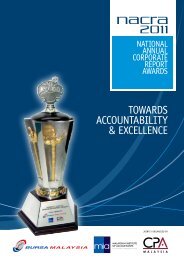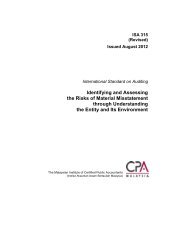Pricing Convertible Securities - The Malaysian Institute Of Certified ...
Pricing Convertible Securities - The Malaysian Institute Of Certified ...
Pricing Convertible Securities - The Malaysian Institute Of Certified ...
Create successful ePaper yourself
Turn your PDF publications into a flip-book with our unique Google optimized e-Paper software.
<strong>The</strong> <strong>Malaysian</strong> Accountant GLOBAL INSIGHT 35<strong>The</strong> proposed Statement is intended to improve accountingand financial reporting by providing standards for combinations inthe governmental environment. Specifically, it would require stateand local governments to:(a) Identify whether a government combination is a governmentmerger, government acquisition, or a transfer of operations(b) Use carrying values to measure the assets and liabilitiescombined in a government merger or transfer of operations(c) Measure acquired assets and liabilities based upon theiracquisition values in a government acquisition, and(d) Provide guidance for government operations that have beentransferred or sold.<strong>The</strong> proposed Statement would also require disclosures to bemade about government combinations and disposals ofgovernment operations to enable users of financial statements toevaluate the nature and financial effects of those transactions.“Until now, state and local governments have accounted formergers and acquisitions by referring to accounting and financialreporting guidance intended for the business environment,” saidRobert Attmore, GASB chairman. “Based on our research andfeedback from stakeholders, the GASB decided to propose newguidance tailored to governmental situations and circumstances,to enable financial statement users, preparers, and auditors toevaluate the specific nature and financial effects of thosetransactions.”<strong>The</strong> amendments in this proposal would be effective forperiods beginning after December 15, 2013, and would be appliedon a prospective basis. Early application of the standards would beencouraged.(Source: www.accountingeducation.com)FASB Responds to FAF’s Post-Implementation Review Report onFIN 48<strong>The</strong> FASB has issued its response to the Financial AccountingFoundation’s (FAF) Post-Implementation Review (PIR) Report onFASB Interpretation No. 48, Accounting for Uncertainty in IncomeTaxes (FIN 48). In its response, the FASB noted that the PIR Reportfindings affirm the overall effectiveness of FIN 48. In particular,stakeholder feedback indicates that FIN 48 has resulted in moreconsistent recognition and measurement of uncertain taxpositions and more relevant reported information about income taxuncertainties. Most preparers said that they did not incursignificantimplementation and compliance costs.“<strong>The</strong> FASB is pleased with the PIR team’s finding thatFIN 48 is resulting in more consistent and useful information forinvestors and other users of financial statements,” said FASBChairman Leslie F. Seidman.“<strong>The</strong> FASB welcomes the PIR team’s recommendations tocontinue to improve our processes and we are taking steps tomake enhancements in those areas. While the FASB does not planto undertake a separate project to review FIN 48 at this time, theBoard plans to consider the technical findings in future efforts tosimplify our standards, converge them with International FinancialReporting Standards, or both,” Seidman added.<strong>The</strong> FASB said that it welcomes the PIR team’srecommendations for improving the standard-setting process,including suggestions that the FASB involve investors earlier in theprocess, more completely describe the Board’s cost-benefitanalysis, and elaborate on how the Board applies its criteria for reexposingdecisions reached in re-deliberations.<strong>The</strong> Board said that the criteria for a review orreconsideration of FIN 48 were not met, based on the criteriaestablished in the FASB Rules of Procedure. However, the FASBsaid it will consider the PIR Report technical findings in a review ofwhether simplifications or modifications in U.S. GAAP arewarranted for private companies and in its analysis of the remainingdifferences between U.S. GAAP and IFRS, in particular, IAS 12,Income Taxes.“With this response from the FASB, we complete our firstPost-Implementation Review,” said John J. Brennan, chairman ofthe FAF Board of Trustees. “<strong>The</strong> Trustees believe that this processprovides critically important feedback in the standard-settingprocess and we’re pleased with the overall result. We’ll take whatwe’ve learned from this first effort and use it to improve the processas we move forward with our next accounting standard reviews.”<strong>The</strong> FASB has made available online its full response to theFIN 48 PIR Report.<strong>The</strong> FASB issued FIN 48 in June 2006 to reduce diversity inpractice in recognizing, measuring, and reporting uncertaintiesrelating to income tax positions. <strong>The</strong> review of FIN 48 (codified inAccounting Standards Codification Topic 740, Incomes Taxes),was undertaken by an independent FAF team working under theoversight of the FAF Board of Trustees. <strong>The</strong> team’s formal report isavailable on the FAF website.<strong>The</strong> PIR process is designed to be independent of thestandard-setting process of the FASB and the GovernmentalAccounting Standards Board (GASB). <strong>The</strong> FAF review staff reportsto the Trustees and FAF president, but members are drawn fromexperienced FASB and GASB staff to promote a collaborativereview process aimed at improving the standard-setting process.<strong>The</strong> review staff tested the initial review process by selecting oneFASB and one GASB standard, with the FIN 48 standard as the firsttest.(Source: www.fasb.org/home)w w w . m i c p a . c o m . m y M a r c h - A p r i l 2 0 1 2


